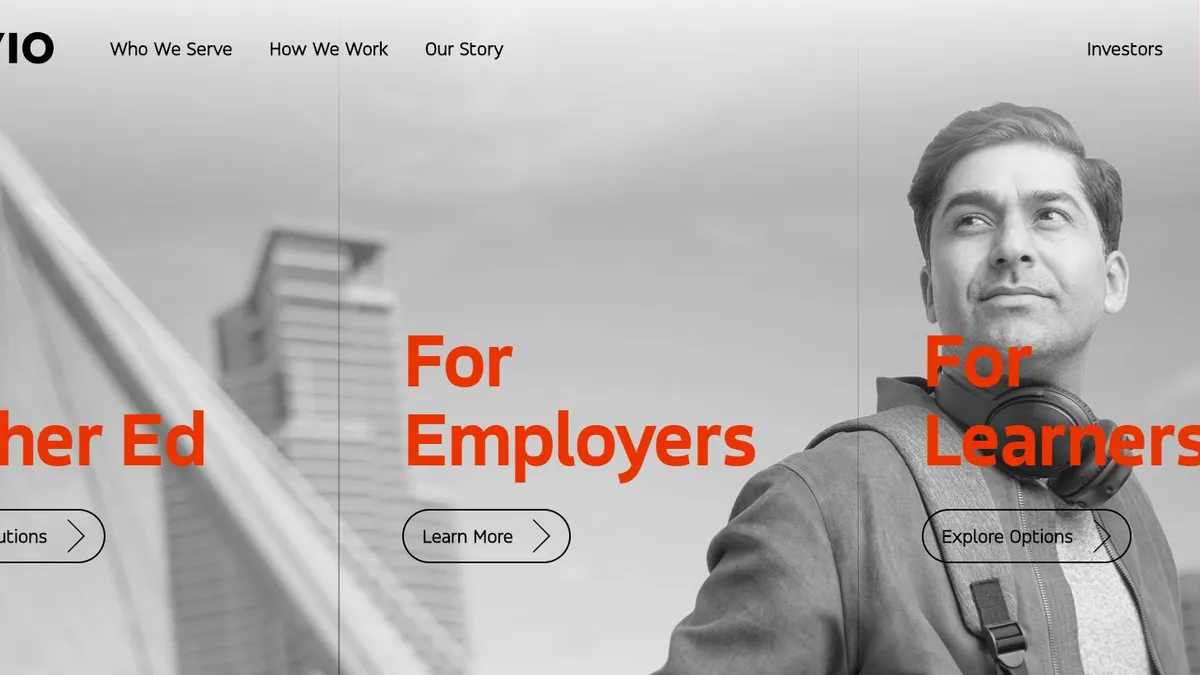Dive Brief:
- Bridgepoint Education, which last week changed its name to Zovio, has acquired online tutoring services company TutorMe for $2.8 million in cash and nearly 310,000 in shares, according to an SEC filing. The deal also includes another $1 million-plus in cash, as well as shares, paid out to some of TutorMe's service providers.
- TutorMe offers on-demand help with more than 300 subjects, including for standardized tests, and reaches hundreds of thousands of students, according to company materials. The platform connects tutors (who the company offers at least $16 an hour) and students, who pay monthly on a per-hour basis for tutoring help. In a press release, Zovio said TutorMe fit with the company's new strategy and "provides a platform through which Zovio will be able to offer additional products in the future."
- The new name emerged as part of a rebranding campaign meant to highlight the company's transition from a for-profit college operator to an educational and technological services company. Along with the rebrand, the company announced last week it is moving its headquarters from San Diego to the Phoenix area. Vickie Schray, Zovio executive vice president and chief external affairs officer, said in an interview with Education Dive that the company sought out a state that was "business-friendly" with lower cost of living and that had a talent pool to support its new focus.
Dive Insight:
The acquisition, rebrand and move are all ways in which the company formerly known as Bridgepoint is trying to reinvent itself as a tech-focused services provider.
Details of the headquarters are still being worked out, and it could be two years before the company is set up in the Phoenix suburb of Chandler, Arizona, Schray said. The company still expects to maintain a presence in San Diego and other offices. Schray said she didn't know how much attrition the company might see from employees who don't want to make the move, though early responses from employees about the move have been good, she added.
Of the TutorMe purchase, Zovio CEO Andrew Clark said in a statement, "We see many immediate opportunities to leverage the TutorMe platform to serve additional higher education institutions and employers, who can use this on-demand network to coach learners through their course progression." Zovio Chief Operating Officer Greg Finkelstein told Education Dive in an interview that over the long run the company saw broader applicability of the platform, potentially in the "skills-to-employment" space.
Not even a month ago, then-Bridgepoint acquired coding boot camp provider Fullstack Academy for $17.5 million in cash and 4.75 million shares. The deal gave the company more digital and subject matter reach and, according to a statement from Clark, "provides a platform from which we can expand into other high demand employment verticals in need of qualified professionals." Finkelstein said the company has not ruled out adding more campuses to Fullstack, which currently has locations in New York and Chicago, but that most growth is expected to come from partnerships with colleges.
More broadly, the company is putting together a suite of services it can offer to university and college partners. Zovio is also looking at potentially acquiring a "more traditional" online program manager (OPM) and another player in the skills-to-employment space, Finkelstein said.
Ahead of the recent buying spree, the company hired a new chief strategy officer to lead its merger and acquisition plans. In recent months it has also added a vice president of learning services and Finkelstein as its new COO. He helped found an early OPM.
Another key to the business model change is the spinoff of Ashford University as a separate nonprofit, a transaction that the IRS has approved and that Ashford's accreditor is still reviewing. In that respect, the company is following the lead of other for-profits, including Kaplan and Grand Canyon, which have both spun off their colleges while making revenue from the new entities through service deals.
Enrollment in Ashford's bachelor's programs — more than three-fourths of all enrollment across the company in 2018 — has fallen more than 17% since fiscal year 2016, according to the company's latest 10-K. Revenue declines have followed, dropping every year over the past five years for a total decline of more than 30% since fiscal 2014. In its most recent quarterly filing, the company reported a 10% year-over-year revenue decline, widening its net and operating losses, and a 6.3% total decrease in enrollment.















